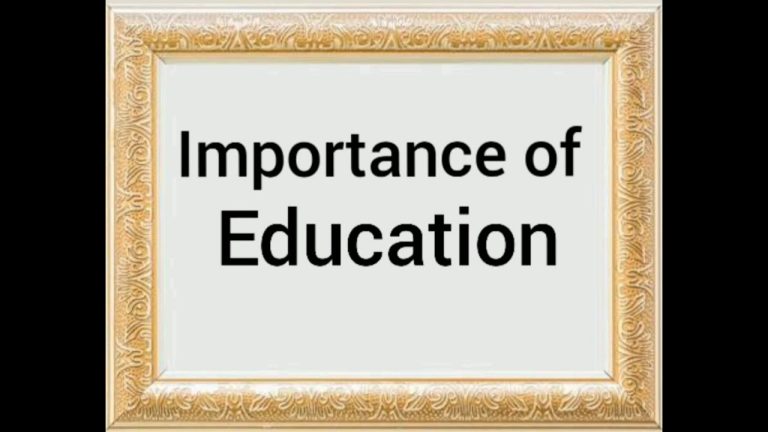Importance of Education
Education is a fundamental pillar of human development and societal progress. It is a powerful tool that shapes individuals’ lives, empowers communities, and fosters economic growth. Education’s importance transcends the mere acquisition of knowledge; it encompasses the cultivation of critical thinking, moral values, and the ability to contribute meaningfully to society. In this article, we explore the multifaceted importance of education and its profound impact on various aspects of life.
Personal Development
Education plays a crucial role in the personal development of individuals. It provides the knowledge and skills necessary for personal growth, helping individuals to understand themselves better and realize their potential. Through education, people learn to think critically, solve problems, and make informed decisions. It fosters intellectual curiosity, creativity, and a lifelong love of learning. Furthermore, education helps individuals develop self-discipline, time management, and perseverance, which are essential for personal success and fulfillment.
Economic Growth
Education is a key driver of economic growth and development. A well-educated workforce is essential for the prosperity of any nation. Education increases individuals’ productivity and efficiency, leading to higher wages and better job opportunities. It equips people with the skills needed to adapt to changing economic conditions and technological advancements. Moreover, education stimulates innovation and entrepreneurship, driving economic development and competitiveness. Countries with high levels of education tend to have stronger economies and higher standards of living.
Social Equity and Inclusion
Education is a powerful tool for promoting social equity and inclusion. It helps to reduce inequalities by providing everyone, regardless of their background, with the opportunity to succeed. Education empowers marginalized groups, such as women, minorities, and people with disabilities, by providing them with the knowledge and skills to participate fully in society. It also promotes social mobility, enabling individuals from disadvantaged backgrounds to improve their socio-economic status. By fostering a more inclusive society, education contributes to social cohesion and stability.
Health and Well-being
Education has a profound impact on health and well-being. Educated individuals are more likely to make healthier lifestyle choices, understand health information, and access healthcare services. Education also contributes to improved maternal and child health, reduced infant mortality, and increased life expectancy. Moreover, education is associated with better mental health outcomes, as it provides individuals with the tools to cope with stress and adversity. Public health initiatives often rely on education to disseminate information and promote healthy behaviors.
Civic Engagement and Democracy
Education is vital for the functioning of democracy and the promotion of civic engagement. It provides individuals with the knowledge and skills necessary to participate actively in civic and political life. Educated citizens are more likely to vote, engage in community activities, and advocate for their rights and the rights of others. Education fosters critical thinking, informed decision-making, and a sense of civic responsibility. It helps to develop an understanding of democratic principles, human rights, and the rule of law, which are essential for the maintenance of a healthy democracy.
Environmental Sustainability
Education plays a crucial role in promoting environmental sustainability. It raises awareness about environmental issues and the impact of human activities on the planet. Through education, individuals learn about sustainable practices and the importance of conserving natural resources. Environmental education encourages people to adopt eco-friendly behaviors and to advocate for policies that protect the environment. By fostering a culture of sustainability, education contributes to the preservation of the planet for future generations.
Technological Advancement
Education is essential for technological advancement and innovation. It provides the foundation for scientific research and the development of new technologies. Educated individuals are better equipped to understand, utilize, and contribute to technological advancements. Education in science, technology, engineering, and mathematics (STEM) fields is particularly important in today’s knowledge-based economy. It drives progress in various sectors, including healthcare, communication, transportation, and energy. By promoting technological literacy, education helps societies to harness the benefits of technology and to address the challenges it poses.
Cultural Understanding and Global Peace
Education fosters cultural understanding and promotes global peace. It exposes individuals to diverse perspectives, traditions, and values, helping them to appreciate and respect cultural differences. Education encourages empathy, tolerance, and the ability to engage constructively with others. It plays a crucial role in conflict resolution and the promotion of peaceful coexistence. By fostering a sense of global citizenship, education contributes to the development of a more harmonious and interconnected world.
Lifelong Learning
Education is not confined to formal schooling; it is a lifelong process. Lifelong learning is essential for personal and professional development in a rapidly changing world. It enables individuals to acquire new skills, adapt to changing circumstances, and stay competitive in the job market. Lifelong learning fosters resilience, creativity, and the ability to innovate. It also contributes to personal fulfillment and the ability to lead a meaningful and purposeful life. By promoting a culture of continuous learning, education helps individuals to navigate the complexities of the modern world.
Conclusion
The importance of education cannot be overstated. It is a cornerstone of personal development, economic growth, social equity, health and well-being, civic engagement, environmental sustainability, technological advancement, cultural understanding, and lifelong learning. Education empowers individuals and communities, driving progress and fostering a more just and equitable society. As we face the challenges of the 21st century, investing in education is more crucial than ever. By recognizing and nurturing the transformative power of education, we can create a brighter future for all.



